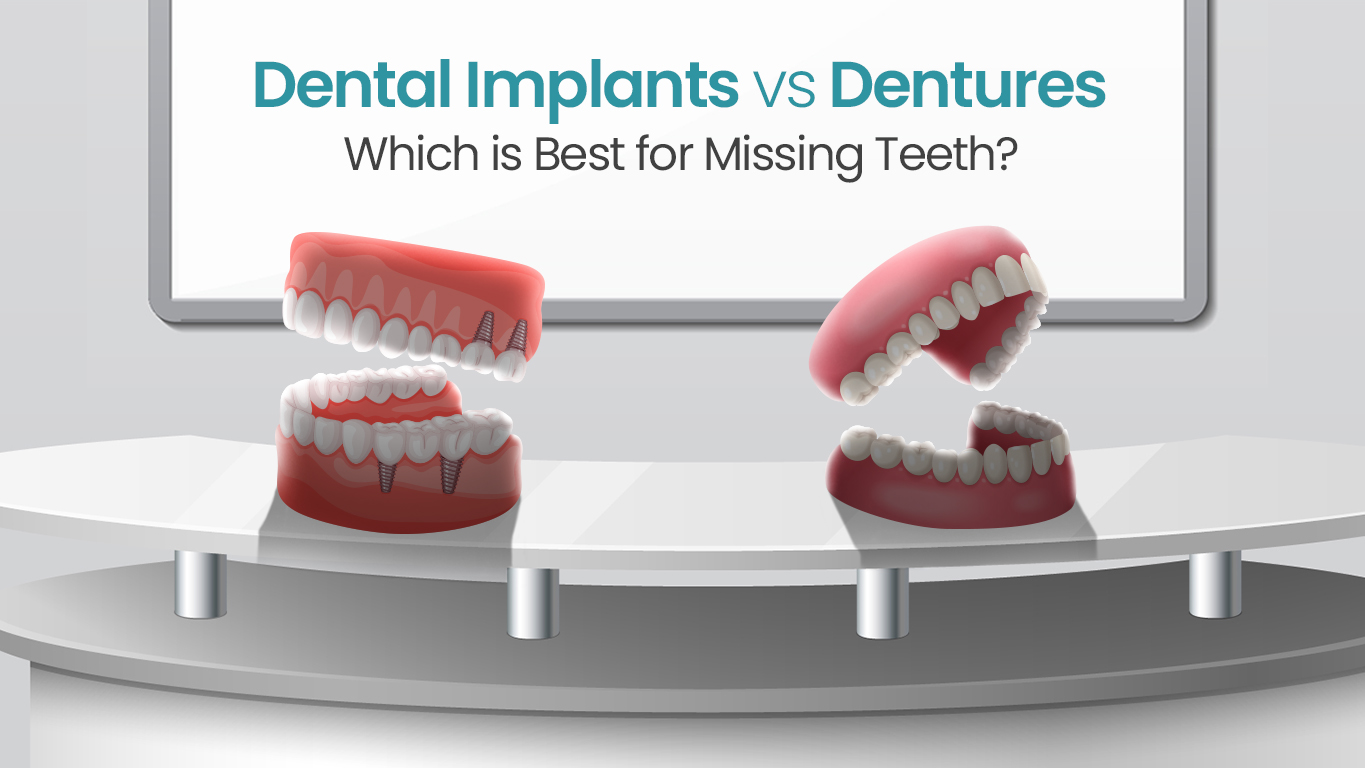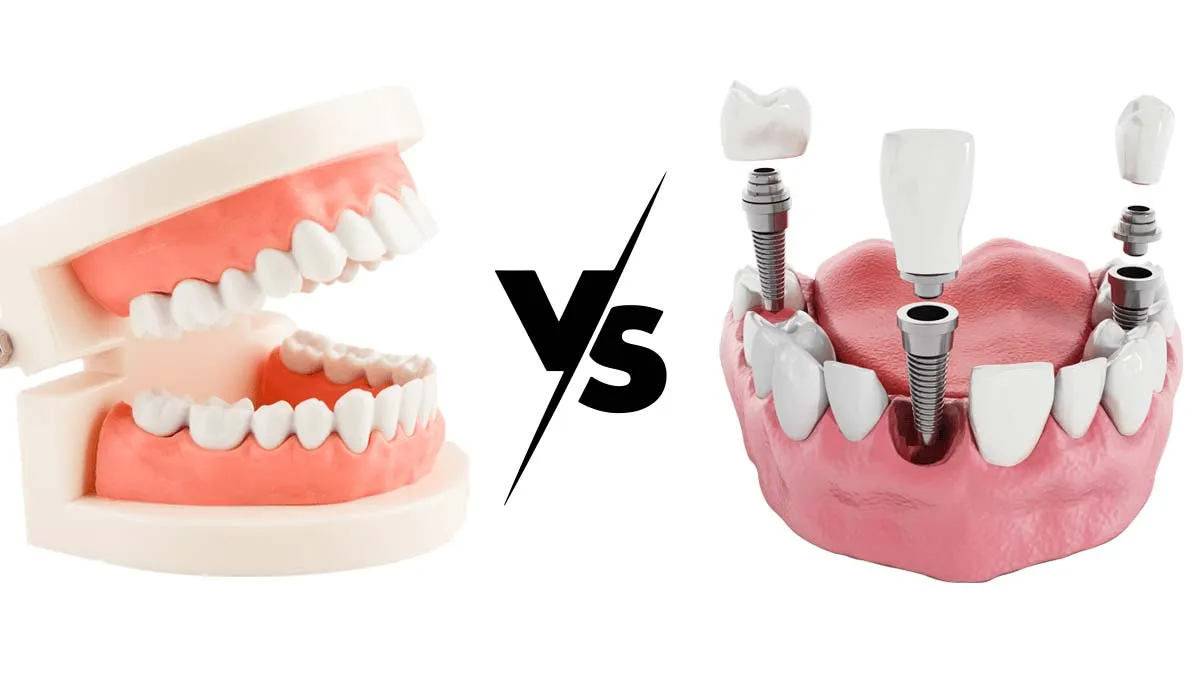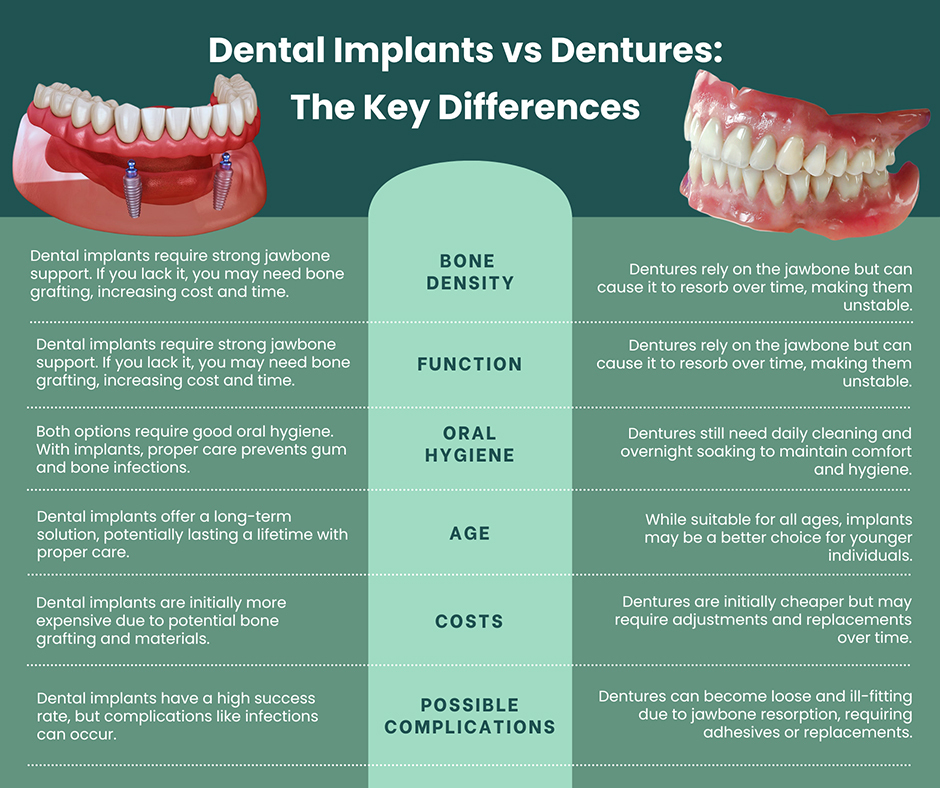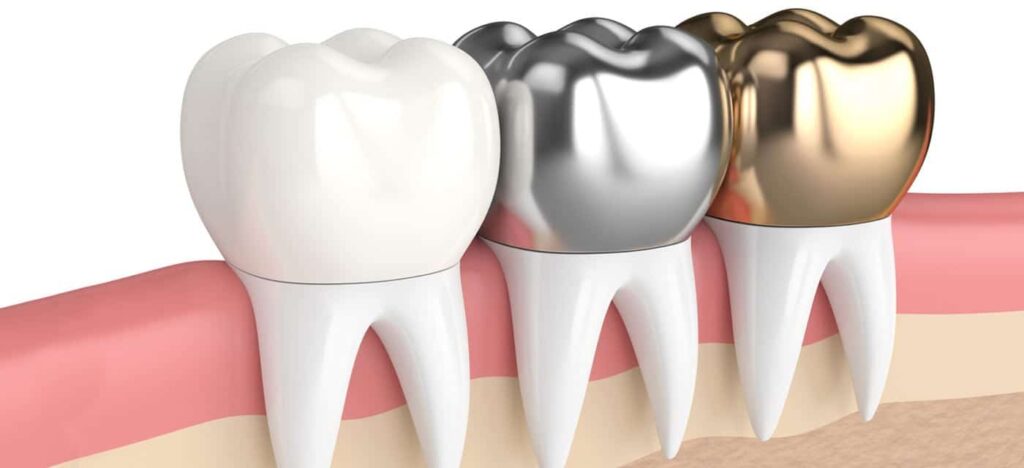
Missing teeth can cause various difficulties in life. Problems in eating, speaking, and appearance are to name a few. Therefore, it is important to find replacement options. Dental implants and dentures fall among the few options that we have to replace teeth.
As both, dental implants and dentures, serve the purpose of replacing natural teeth, it is hard to decide between the two. Thus, this article focuses on the advantages and disadvantages of both options as well as factors to consider to choosing any of them.
Choosing the right teeth replacement solution includes various factors like budget, personal preference, condition of your oral cavity, longevity, and more. Before further ado, let’s dive into details about dental implants vs. dentures.

What are Dental Implants?
Dental Implants are effective dental solutions for replacing missing teeth. The implants consist of an artificial titanium root and a dental crown or artificial tooth. The root is implanted surgically into the jawbone over time. Later, the dentist covers the implant with an artificial tooth/ teeth or dental crowns.
Dental implant surgery takes a longer time and several appointments at the dental clinic. However, it serves as a permanent, durable, and effective solution for missing teeth. Patients with dental implants can enjoy normal functioning of life like enhanced aesthetic appearance, normal bite force, and no issues in speech. Overall, the implants offer stability and longevity.
What are Dentures?
Dentures are prosthetic removable or permanent teeth that are fitted into the mouth. Dentures do not require knowing the condition of the jawbone in the oral cavity. Patients can get full sets of dentures for the upper or lower jaw or partial dentures to replace a few missing teeth.
For denture fitting, dentists take the impression of gums, bite force, alignment and length of upper and lower jaw, and more. After taking the impression, the dentists construct a prosthetic denture set in the lab. Lastly, the dentist places the dentures into the mouth using an adhesive. Or you can get removable dentures.
Factors To Consider To Decide Between Dental Implants vs. Dentures

Here are some factors to consider before deciding between dental implants vs. dentures:
The procedure of Dental Implants vs. Dentures
The procedure of dental implants is time-consuming and complex. It is a surgical method that gives the clients the feel and look of natural teeth. It uses a cut-open-and-treat method which involves a lengthy procedure. However, dentures take less time and simple execution. The patients do not have to visit the dental clinic repeatedly. It does not involve any surgical process. The lab-made dentures are placed into the mouth using an adhesive.
Considering the procedures of Dental implants vs. dentures, dentures are easier and less time-consuming.
Cost of Dentures vs Implants
Budget plays a vital role in deciding between a dental solution. Many are confused between dentures vs dental implants. Dental implants are much more expensive than dentures for teeth replacement.
The cost of dental implants starts at least PKR 50,000 and goes above, according to several implants and the condition of the oral cavity. However, the dentures are comparatively cheaper. You can get dentures at a cost starting from PKR 1500 in Pakistan for partial dentures. For a full set, the cost increases.
To decide between what is right for you according to your condition or your budget, you can consult with a dentist.
Comfort and Stability
While both, implants and dentures, serve as a natural looking and feeling replacement for original human teeth, both have a few differences. Dental implants are placed inside the jawbone as natural teeth. Thus, it provides maximum comfort, and efficiency in chewing and speech. They replace teeth for natural-looking feel better than dentures.
However, dentures are placed without any support of the jawbone but with a special adhesive. They may feel a little uncomfortable while chewing or speaking. They get attached to the adjacent teeth. Therefore, if the existing teeth get weak, the dentures lose their stability and cause discomfort in functioning.
Bone Density
Considering this factor, dentures are suitable for candidates with less or no bone density. Because dentures do not require support from the bone or bone grafting procedure. However, dental implants are more complicated. If the candidate has lost the bone due to any disease, injury, or old age, he/ she may not be suitable for an implant. Moreover, bone grafting for implants may make the process of implanting more expensive and time-consuming.
Hygiene
Dentures are removable replacement teeth. Thus, they require more hygienic maintenance. There must be regular cleaning and adjustments due to gum changes and wear and tear, often.
However, although expensive, dental implants are just like natural teeth. They are low maintenance, unlike dentures. With regular brushing and flossing, you can take care of the implants without any further hygienic maintenance.
Durability
Durability or longevity is an important factor when investing in dental procedures. Dentures are effective but they last for comparatively less time than dental implants. They may go through wear and tear and may get loose while the jaw structure changes with age and time. However, implants are made of durable material, titanium and fixed permanently into the bone. Therefore, the success rate is higher and they stay durable for decades.
Hence, age also matters when deciding between dental implants vs. dentures. If you are a senior, dentures may go well for you as they are less expensive and less time-consuming. However, people younger than 60 years of age, shall choose dental implants for hassle-free decades.
Health Conditions
The procedures of these dental treatments may depend upon a person’s health conditions. Dentures are typically safer than implants because they do not involve any complicated steps. Meanwhile, dental implants may be affected due to health conditions like gum diseases, diabetes, cancer, etc. These conditions may affect the recovery and successful implantation. Therefore, consulting the dentist about the health conditions is vital for a better choice of teeth replacement.
Reason for Teeth Replacement
The purpose behind the teeth replacement procedure matters a lot. If your purpose is to restore a bright smile and enhance the aesthetic appearance of your face, you can rely on dentures. However, for normal and stable teeth functioning like chewing, appearance, and speaking, you should rely on dental implants.
Conclusion
The choice between dental implants vs. dentures looks like a difficult one. However, these factors may help you prepare for the right decision.
Both of them are effective and beneficial in their own ways. Implants can offer more stability, durability, and low maintenance. At the same time, dentures are cost-effective, less complicated, less time-consuming, and look just like natural teeth.
Both have advantages and disadvantages of their own. To help you make the right decision, book your consultation with a certified dentist. Keep your budget, health conditions, preferences, maintenance needs and procedures under consideration to decide the best for you.
FAQs
Is it better to get implants or dentures?
Dentures and implants, both, have their own pros and cons. It depends upon the patient’s personal preference or other factors to decide whether to get dentures or dental implants.
Why do dentists discourage dentures?
Many dentists discourage dentures for various reasons. Dentures may breed bacteria, cause discomfort, gum irritation, jawbone damage, etc. Therefore, it is better to get implants as an effective solution.
Why would a dentist not recommend an implant?
Dentists may not recommend implants if you are not a suitable candidate. The reasons may be insufficient bone density, health conditions, budget, and others.
Are dental implants good or bad for you?
Dental implants are safe and effective solutions to replace missing tooth/teeth. They prevent bone loss and look and function like natural teeth by restoring aesthetic appearance, chewing and speech ability.



